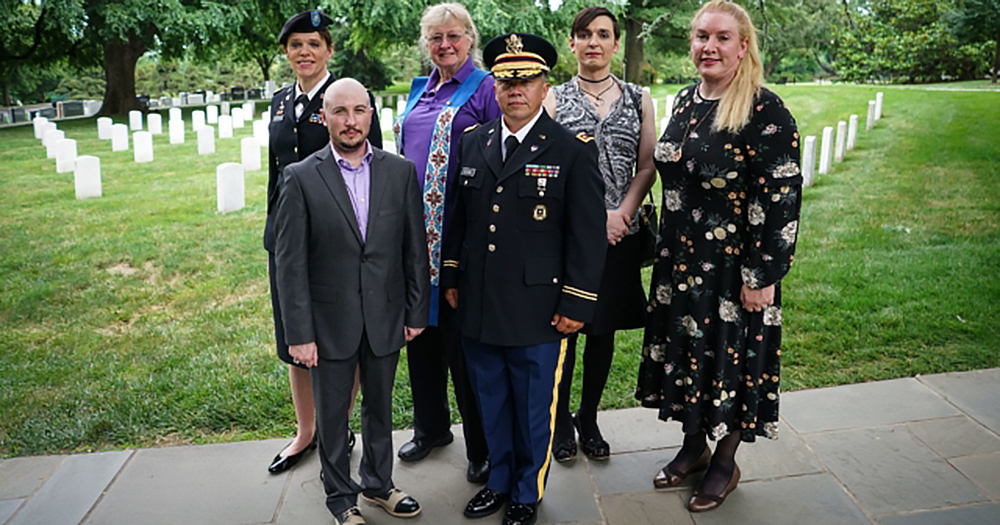A memo to military services from the Department of Defence has outlined how and when the transgender military ban, announced by President Trump in 2017, is to be put into practice.
The memo, signed by deputy defence secretary David L. Norquist, orders the dismissal of the vast majority of transgender troops effective from April 12. It states that a service member is to be dismissed if he or she is “unable or unwilling to adhere to all applicable standards, including the standards associated with his or her biological sex, or seeks transition to another gender.”
The new rules fall a little short of the full transgender ban initially intended by Trump. Transgender troops in active service who had medically transitioned three or more years prior to enlisting will be allowed to continue their work.
Those already in service, along with anyone who has signed an enlistment contract by the cut-off date of April 12, will be allowed to continue with plans for hormone treatments and gender transition – but only if they have received a diagnosis of gender dysphoria before the cut-off. Troops receiving this same diagnosis after April 12 will have to serve in their birth gender or face dismissal, and will be forbidden from seeking hormone treatments or gender reassignment surgery.
Roughly 14,700 transgender military personnel are currently in active service or in the Reserves, and less than a thousand of these people qualify for the exemptions that would allow them to continue serving. The military is the largest employer in the nation, and if implemented this ban will mean the largest layoff of trans people in world history.
The ban reverses progress on trans rights in the military made under the Obama administration. In 2016, it was announced that transgender people in military service would be allowed to serve openly. The military set July 1, 2017, as the date from which new trans recruits would be allowed to enlist.
When Trump took office, his administration immediately delayed this enlistment date. A few weeks later, the President took a further backstep by tweeting that existing transgender military personnel would no longer be allowed to serve. Those who had come forward as trans, trusting in the protection of the Obama-era policy, found their jobs once again at risk.
After consultation with my Generals and military experts, please be advised that the United States Government will not accept or allow……
— Donald J. Trump (@realDonaldTrump) July 26, 2017
….Transgender individuals to serve in any capacity in the U.S. Military. Our military must be focused on decisive and overwhelming…..
— Donald J. Trump (@realDonaldTrump) July 26, 2017
The new policy has faced four legal challenges, and judges in these lawsuits had issued injunctions to block the policy from coming into effect while the cases were heard. As of last week, though, all four injunctions had been struck down by the courts.
The legal battle over the ban continues, with attorneys in one case contending that an injunction against the policy remains in place and is being ignored by the government. GLAD and the National Center for Lesbian Rights, representing trans service members in the case of Doe v. Trump, argue that the injunction in that case still stands as the decision to invalidate it will not be finalised until the plaintiffs have an opportunity to petition the full court to review it and that petition is resolved.
A statement issued by Harper Jean Tobin, director of policy for the National Center for Transgender Equality, condemns the ban. “The start of this looming purge represents an unprecedented step backwards in the social and civil progress of our country and our military,” says Tobin. “This is the first time in American history such a step forward has been reversed, and it is a severe blow to the military and to the nation’s values.”
Meanwhile, President Trump has again angered the worldwide LGBT+ community by planning to cut funding for the global fight against HIV and AIDS by $1 billion.
© 2019 GCN (Gay Community News). All rights reserved.
Support GCN
GCN is a free, vital resource for Ireland’s LGBTQ+ community since 1988.
GCN is a trading name of National LGBT Federation CLG, a registered charity - Charity Number: 20034580.
GCN relies on the generous support of the community and allies to sustain the crucial work that we do. Producing GCN is costly, and, in an industry which has been hugely impacted by rising costs, we need your support to help sustain and grow this vital resource.
Supporting GCN for as little as €1.99 per month will help us continue our work as Ireland’s free, independent LGBTQ+ media.

comments. Please sign in to comment.